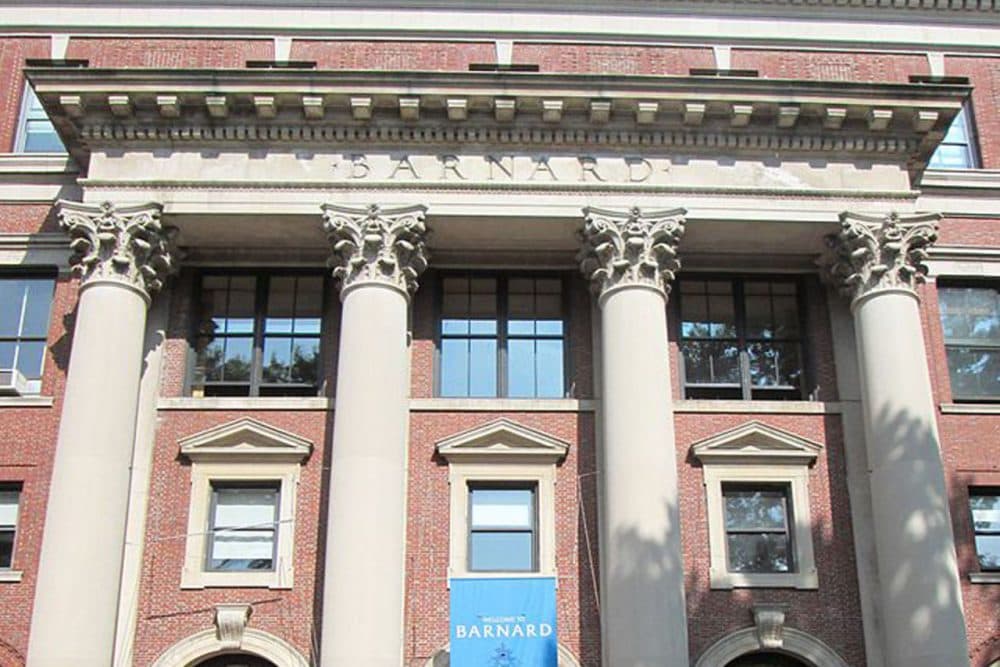Advertisement
On Pointers Share Their College Senior Thesis Topics

Our May 6, 2015 hour featuring a roundtable of college seniors who wrote a theses this year made many members of our staff nostalgic for their own days as ink-stained, topic-obsessed college wretches. Years later, they took the time to share what writing a couple dozen pages on a highly-focused research topic did for them then, and now.
If you want to graduate from Barnard College, you need to write a senior thesis. Mine was titled, "The Three Melville Revivals: A Study of a Literary Reputation." My research focused on three books: ”Typee,“ “Moby Dick,” and “Pierre, or the Ambiguities." I did a deep dive into the social and political forces at work when each book was popular. I read captains' logs, some Freud and scoured the New Testament. I read about modernization in America and the country’s seafaring past. Late into the night, I wondered — What changed when settlers branded this part of our continent “America”? Or when Melville called the white whale Moby Dick? Was crazy Pierre, with all his ambiguities, a treasure trove for a country deep into psychoanalysis? These were the questions that filled my head. My parents only had one question: What was my plan after college? For that, I had no answer. In early-May, I handed in my thesis, all 75 pages, neatly typed on erasable paper, bound in a faux-letter black binder. I was proud. The only long-term value of this thesis is that I briefly had a dog named Typee, and I've had several goldfish named Moby Dick.
-- Karen Shiffman
In the early stages of writing my senior thesis in American music history at the University of North Carolina at Chapel Hill, an interview subject at New York City's Metropolitan Opera made me feel pretty silly about the entire exercise. "You realize there's a reason why none of these works are ever performed, right?" he said, shaking his head with a hearty chuckle. He wasn't entirely wrong, but that vague reason drove me to more than 18 months of research and drafting that resulted a stack of paper I like to call, "'Too Real to Be Funny': Social Protests and Cultural Memory Through Four Post World War II American Operas, 1934-1954." I examined American cultural trends and social change in the pre- and post-World War II periods, using the operas of Leonard Bernstein, Aaron Copland, Marc Blitzstein and Virgil Thompson as a kind of musical magnifying glass. It was thrilling, sometimes dusty work, and I was lucky enough to peruse stacks of personal correspondence and assorted documentation from each of the composers involved. I'd like to say that I discovered a compelling reason to immediately revive "Trouble in Tahiti" or "Regina" at the Met next season, but I found something better: American social history, and a deep sense of personal and professional fulfillment. (*Plus, piles of smutty letters that Leonard Bernstein wrote Aaron Copland.)
-- Nick Andersen
My undergraduate school, The College of Wooster, required all students to complete a senior Independent Study (I.S.). Mine was on cyanobacteria (aka pond scum). Cyanobacteria can float to the surface of freshwater bodies and is sometimes toxic, poisoning livestock and humans. Fluorescent labeling can be used to detect the toxins, which was the focus of research I did while in Scotland. Since my interest was in science journalism, my thesis was a compilation of that research and interviews with top experts on cyanobacteria in Dayton, Ohio and Dundee, Scotland. The end result was a series of articles written for a range of audiences: the college's alumni publication, a student publication of the American Chemical Society, a chemistry trade publication, and a popular science magazine.
-- Eileen Imada
In my senior thesis at Bowdoin College, I traced the evolution of Ralph Waldo Emerson’s philosophy from his early essays — those in his “First Series” — through his anti-slavery writings and his later essay, “Experience.” In his early writings, Emerson posited an expansive and radical notion of freedom. In “Self-Reliance,” “The American Scholar,” “Circles,” and “Nature,” among other essays, he articulated an idea of freedom that went far beyond the idea of liberty articulated in the American liberal tradition. Liberal freedom depends on the existence of an historical identity and a self that has an interest in property, security, and preservation. For Emerson, by contrast, freedom meant transcending the workings of power that sought to define the self, and instead having a truly original relation with the universe. Emerson’s dream of freedom was, however, severely challenged by the growing crisis of slavery. Emerson came to recognize the necessity of political action and association in order to combat what he saw as an absolute moral wrong. He could not advocate for radical transcendent freedom while so many in America were being denied legal freedom. Between 1840 and 1863 his rhetoric shifted dramatically, from transcendent to liberal, from expansive to constrained. His project was no longer one of self-overcoming; instead, he was a limited and constrained being seeking social change from within a system that he had previously tried to abandon. In his famous essay, “Experience,” Emerson spoke as a man who was a prisoner of his own subjectivity, but embraced the poverty of that limitation and found some possibility in subjective experience.
-- Caitlin O'Keefe